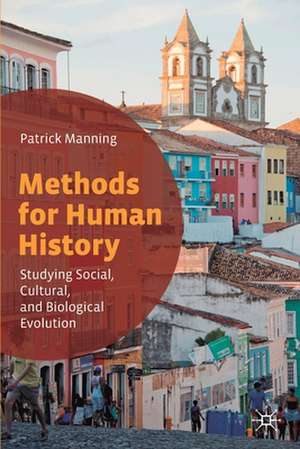Methods for Human History: Studying Social, Cultural, and Biological Evolution
Autor Patrick Manningen Limba Engleză Paperback – 29 sep 2020
Preț: 212.06 lei
Nou
Puncte Express: 318
Preț estimativ în valută:
40.58€ • 44.25$ • 34.22£
40.58€ • 44.25$ • 34.22£
Carte tipărită la comandă
Livrare economică 24 aprilie-08 mai
Preluare comenzi: 021 569.72.76
Specificații
ISBN-13: 9783030538811
ISBN-10: 3030538818
Pagini: 199
Ilustrații: IX, 199 p. 4 illus., 1 illus. in color.
Dimensiuni: 155 x 235 x 17 mm
Greutate: 0.3 kg
Ediția:1st ed. 2020
Editura: Springer International Publishing
Colecția Palgrave Macmillan
Locul publicării:Cham, Switzerland
ISBN-10: 3030538818
Pagini: 199
Ilustrații: IX, 199 p. 4 illus., 1 illus. in color.
Dimensiuni: 155 x 235 x 17 mm
Greutate: 0.3 kg
Ediția:1st ed. 2020
Editura: Springer International Publishing
Colecția Palgrave Macmillan
Locul publicării:Cham, Switzerland
Cuprins
1.Introduction.- Part I: Methods for Human History.- 2. Human Evolution: Biological, Cultural, and Social.- 3. Physical Science and Biological Coevolution.- 4. Systems and Information Science.- 5. Behavior of Individuals and Groups.- 6. Study of Human Institutions.- 7. Emotions and Human Nature
Part II: Disciplines and Theories.- 8. Disciplines and their Evolution.- 9. Natural Selection in an Imperial Era, 1850–1945.- 10. DNA in a Progressive Era, 1945–1980.- 11. Ecology and Society in a Neoliberal Era, 1980–2010.- 12. Cross-Disciplinary Analysis in Global Tension, 2010–2020.
Notă biografică
Patrick Manning is Andrew W. Mellon Professor of World History, Emeritus, at the University of Pittsburgh, where he was the founding director of the World History Center from 2008 to 2015. Mannnign served as president of the American Historical Association from 2016-2017, and is currently the president of the World History Network. He has authored and edited over fifteen books, including the forthcoming title A History of Humanity (2020).
Textul de pe ultima copertă
This book presents a concise yet comprehensive survey of methods used in the expanding studies of human evolution, paying particular attention to new work on social evolution. The first part of the book presents principal methods for the study of biological, cultural, and social evolution, plus migration, group behavior, institutions, politics, and environment. The second part provides a chronological and analytical account of the development of these methods from 1850 to the present, showing how multidisciplinary rose to link physical, biological, ecological, and social sciences. The work is especially relevant for readers in history and social sciences but will be of interest to readers in biological and ecological fields who are interested in exploring a wide range of evolutionary studies.
Caracteristici
Provides a concise review of the numerous methods used in the study of human evolution Details the history of development and interaction of these methods of study, showing the path by which multi-disciplinary analysis has grown Serves as an introduction to exploring evolutionary studies with suggestions for further reading on each on of the principle methods, field by field
